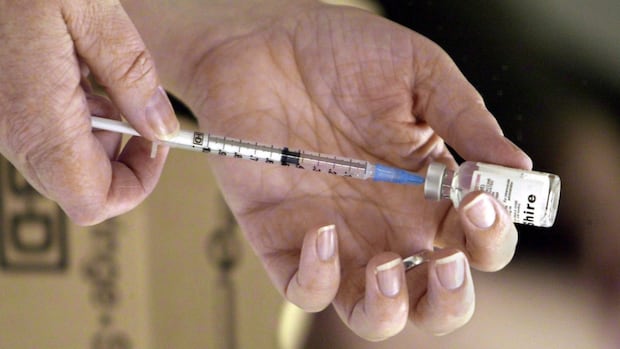
The rate of vaccination is slipping around the world. Canada is not immune, new study says
After decades of progress, the rate of childhood vaccination has started interrupting or falling worldwide in recent years, and canada is not immune for trend, suggests. New study From the Lancet.
The study estimates 11 childhood vaccines in 204 countries and regions between 1980 and 2023, analyzing more than 1,000 data sources around the world.
It was found that although there was a lot of progress in vaccine coverage for children during that period globally (vaccine coverage against diseases like measles, polio, and pertuses, more than double), progress stalling began, before the covid -19 pandemic.

“Especially in the US and high-age countries, between 2010 and 2019, the measles vaccine coverage has declined in about half countries,” Dr. Jonathan Moser said, “Health Matrix at Washington University and one of the co-owners of studies at the Health Matrix and Evaluation Institute.
The epidemics gave a heavy blow to the vaccination rates, with Moser, with regular shots, more than 15 million children globally, between 2020 and 2023, Moser said.
He said that the world completely overturned the level of pre-political childhood vaccination.
“The epidemic reverse the progress of decades, which we were in reducing the number of zero-khurak children, children who have never received these major vaccines in childhood.”
Vaccine inequalities deteriorate
The epidemic had already made an external impact on those areas, already low vaccine coverage before Kovid -19, Moser said.
The countries of Sub-Sahara Africa saw the biggest disruption for vaccine coverage: five to seven million children in the region have been missed to protect against diseases like polio, pneumococcal disease and rotavirus.
“We have a really long-standing global inequalities and challenges related to vaccination coverage, with many low and medium-or-I-oriented countries than in high-or-a-income countries,” Moser said.
He said that why the rate of vaccination has started, it changes from the country to the country.
A new study published in the Lancet Medical Journal suggests that childhood vaccination has been stable or declined since 2010. Authors say that geopolitical instability is promoting a decline in some countries, but misinformation is largely increasing the decline in high-age countries.
“In some places around the world, they belong to geopolitical instability, they belong to the issues of the supply chain. In many high-ie countries, they are related to the vaccine misinformation and hesitation,” he said.
To assure those who will not vaccinate
In Canada, Moser said, there has been a decline compared to vaccine coverage for most shots. Quick 2000s. Some vaccines have fallen over time, such as shots that prevents diphtheria, tetanus and pertusis. There has been some increase in uptake for other jabs recently – such as measles, kanthamala and rubella (MMR) first dose of vaccine – but not enough to prevent the slight increase outbreaks.
For example, Moser said, the rate of vaccination for measles in 2023 – 92 percent for a dose of MMR and 79 percent for two doses of MMR – herds are below the threshold required for immunity, which is 95 percent.
In high-oriented countries such as Canada, the vaccine misinformation and hesitation has reduced confidence in vaccines and contributed to low vaccination coverage, Moser said.
He said that another contribution could be inequality in factor coverage, as well as with a division of socio -economic status, place, breed or religion, he said.
“New strategies are required to encourage people to listen to reliable and reliable voices, including your health care providers about vaccination.”
Ontario currently has more measles cases than all of the US, and infections are climbing in Alberta and Manitoba. What Jennifer of CBC has done behind the revival of a disease decades ago, and on the front line those people say that it is going to be really difficult to bring this outbreak under control.
In a statement, Canada’s Public Health Agency stated that it is doing research on various and often complex reasons running the vaccine across Canada. The agency says this vaccine is developing evidence-based awareness campaigns and resources to support health care providers facing hesitation.
‘World of traveling’
As the Public Health Authority tries to convince those in Canada who will not be vaccinated, it is also important to support and fund vaccination campaigns worldwide, saying that Canadian experts say.
“The world is a trip world,” Dr. Mahali Bindmore said, a pediatrician at Jim Pattison Children Hospital in Saskatoon.
“If we do not have good vaccine coverage in sub-city Africa, which also touches Canada,” Bindmore said, who also practices in a multi-disciplinary refugee clinic, Reich Clinic.
She says that she sees patients, often from areas facing conflict, where it is difficult to reach vaccines. But they are almost always eager to get the shot, if someone is needed and introduced.
In the context of the refugee population, he said, “We do not see too much textiles,” in the context of the refugee population.

A general internal medical specialist of Calgary, Dr. Gabriel Fabru, who also works with the newcomer population, has also seen that their patients do not hesitate to receive childhood vaccinations.
He says that Canada should make it easier to catch any childhood vaccine for these population that they have been remembered.
“The health system works best if we make regular and easy things that we know is important,” he said.
He said that ramping pre-departure vaccination programs, facilitating the borders medical and vaccine record-sharing and offering vaccines on arrival are easy ways to address this complex problem, he said.

